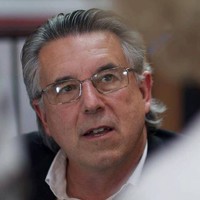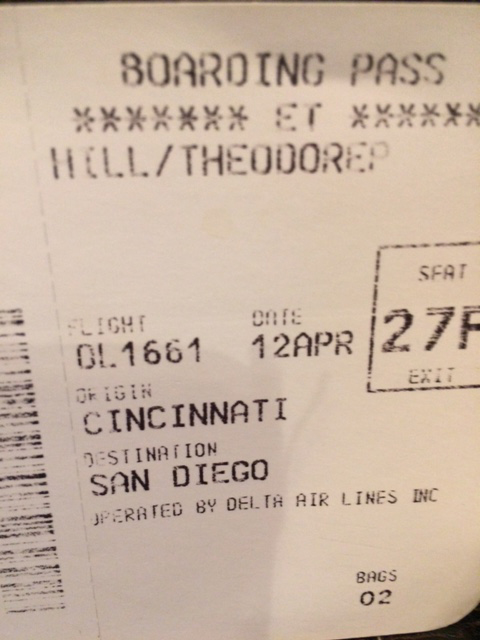By Steve Flairty
NKyTribune columnist
Ted Hill must have felt like his own version of The Man Who Knew Too Much.
The former Boeing and later Sylvania Osram employee found himself anxiety-ridden while sitting as a passenger at the Cincinnati/Northern Kentucky International Airport (CVG) awaiting his Delta Flight 1661 to San Diego over sixteen years ago. He sat at a window overlooking the wing on his side. True, he didn’t see a murder, but what he did see might have had chilling consequences—possibly the deaths of hundreds—had he not responded.
Looking back, he figures that the episode acted as a “nudge” toward a stronger Christian religious faith, something that is especially meaningful for him today.
The day of that memorable occasion, April 12, 2003, started off with an unexpected happening after his wife, Bonita Hill, drove Ted from their Versailles home to the Louisville International Airport to drop him off for his scheduled flight. It was one of his two cross-country airline trips he took every year, one to Oregon to see his parents and one to see his daughter in San Diego.
But this one was different.
“I went inside the terminal and nobody was there (to board the plane),” he said. “The ticket agent told me that the flight had been canceled.” For whatever reason, Ted hadn’t received the notification and was upset about it, but he later called the patient agent an “angel” for her efforts to help.
“She got me a flight to Cincinnati,” he continued, “and from Cincinnati, I’d fly on to San Diego.” There would be a six-hour layover before boarding the west coast flight. That was okay for Ted, but during the wait, he began to experience an ominous feeling… odd things were happening. “People were quiet for some reason. I was one of the first ones to board the plane. I just happened to be assigned to an emergency exit window and was given some literature about what to do in case there was an emergency, so I started to read the stuff.”
The information supplied by Delta asked for him to take on added responsibilities in the case of an emergency, and that concerned him because he was dealing with medical issues with a shoulder, the unfortunate consequences of two automobile accidents he suffered in the previous year. Could he move well enough to do what was expected of him?
He also had another concern.
“There were like ten babies in that place. I thought that was odd. I’d very seldom ever see a baby (on flights),” he said. The ominous feeling worsened.
“So as I was checking everything out looking out the window to see what direction I’d go after I stepped out on the wing to evacuate the plane (in an emergency), I saw this bolt sticking out of the wing and it was right over the engine. I thought: ‘This is not normal.’”
Ted also fought an internal battle. It was in the fairly recent post-9-11 era when news reports not infrequently told of flights being interrupted because of individuals demonstrating suspicious behavior. He trembled while thinking about it. What if this was really nothing and it held up all the passengers from their destinations, severely messing up their personal schedules, creating anger from hundreds of people who would know he was the one responsible?
“I’m sitting there maybe 15 minutes,” he explained. “Things were going through my mind… I was having a hard time. I kept telling myself ‘We’ll be all right.’ (But) If I say something and this plane gets delayed, guess who is going to get the blame.”
By then, Ted’s racing thoughts and pounding heart were intensifying further, and there was an overriding reason he clearly recognized — his awareness of the unusual number of infants on the plane.
“The babies’ crying took over,” he recalled. “It just seemed like they got louder and louder. Boy, I got scared.”
He told the attendant about the bolt and asked her to relay the information to the pilot.
“She calls the pilot,” Ted said, replaying the event, “and then she comes back to look at the wing and then calls the pilot again.”
In about 15 minutes, a technician, using a lift, climbed onto the wing to inspect the issue. Ted watched him pull out the loose four-inch bolt, used a light to look beneath the surface, then left. Ted, still nervous, wondered what would happen next. It would take another 30 minutes to find out.
“Here came another lift with four guys and they jumped on the wing. They started taking the skin off the wing and I looked down and saw a huge mess… electric lines on hydraulic lines. I really got nervous.”
By this time, the passengers began hearing soothing words from the pilot about the delay, and Ted remembers the professional manner he did so. “He was super nice, and when I heard his voice and knew he was doing something about it, I settled down.”
After an hour, the pilot tried operating the rudders (moving them up and down). The results were scary. “There was a big crunching noise,” explained Ted. It was a startling awakening to a real emergency, as all in the plane would now realize. For sure, Ted had uncovered a serious problem by noticing the loose bolt a couple of hours earlier.
Momentarily, the flight attendant walked toward Ted, followed by the pilot. The attendant pointed at Ted, saying to the pilot: “There he is.”

Immediately, the pilot approached and dropped to his knees squarely in front of Ted. “Sir, can I shake your hand? If we’d taken off, we would have been a pile of metal in a field someplace between here and San Diego.”
Dutifully, the pilot went back to the cockpit and began instructions for evacuating passengers and staff from the plane and for a transfer to another. By then, many passengers knew that this humble man from Versailles was their hero, and the appreciation they showed couldn’t be contained.
There were plenty of words of praise and “everybody wanted to buy me coffee or lunch or carry my bags,” he said. Before the backup plane flew to San Diego, one woman asked Ted to take a look at the wing.
The plane arrived in San Diego with no problems. Ted, relieved from the drama but a bit uncomfortable with the newfound attention and adoration, headed for the restroom to stay for an extended time to escape the passenger’s eagerness to show thanks.
“I just didn’t think of myself as a hero,” he said. “I was too scared to be a hero.” But after about 20 minutes, he emerged to a lingering throng of about 25 people expressing heartfelt gratitude. They followed him all the way to the baggage retrieval station to demonstrate their appreciation.
Ted Hill, a humble and gracious man, was simply glad to help.
Today, active at First Christian Church, in Versailles, he sees the experience as a time he “came to know God and Jesus rather than to know ‘about’ them.” He figures the Louisville airport ticket agent, the flight attendant, and the pilot proved providential for the part they played in the drama.
And then, there were the babies… the deciding factor in Ted’s decision to alert the pilot. They’ll likely hear the story someday, too, and it will be an inspiration.
This column originally appeared at KyForward June 25, 2019


























